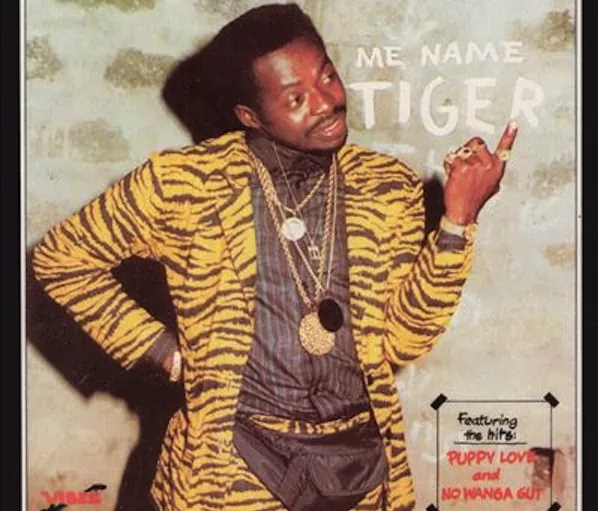Tiger, a name synonymous with Jamaican dancehall in the 1980s and early 1990s, is a man who has lived a life full of twists and turns. From chart-topping hits like “When” and “No Wanga Gut” to a near-fatal accident that threatened to end his career, Tiger’s story is one of incredible resilience and a never-say-die attitude.
Early Career and Rise to Stardom

Born Norman Washington Jackson, Tiger began his musical journey as a singer under the name Ranking Tiger. His early success came with the single “Why Can’t You Leave Dreadlocks Alone?” in 1978. In the early 1980s, he transitioned to deejaying with the Black Star sound system, collaborating with fellow artists like Bruk Back and Anthony Malvo.

By 1985, Tiger exploded onto the scene with a string of local hits, including “No Wanga Gut” (inspired by negativity towards his success) and “No Puppy Love.” This success landed him a record deal with Mango Records, leading to the release of his debut album, “Me Name Tiger,” in 1986.
Chart-Topping Hits and International Recognition

Tiger’s music resonated with audiences, propelling him to stardom. Tracks like “When,” inspired by a freestyle session, cemented his place as a dancehall heavyweight. He collaborated with Anthony Malvo on the song “Come Back To Me,” a heartfelt plea to win back a lost love.
Tiger’s influence extended beyond Jamaican borders. He became one of the first dancehall artists to break into the US hip hop scene with a collaboration with the Fat Boys on “T’ings Nah Go So” in 1989.
The Accident that changed his life forever

Tiger was riding his motorcycle in Half Way Tree, Kingston, when he was hit by a car driven by a woman who is believed to have been a US diplomat. “Mi drop her (girlfriend) in Half Way Tree, and I was returning home to my kids. The stoplight right at Devon House say green, and this uptown lady turned out on me, and mi fly in the air, land on mi head top and knockout. I wasn’t going fast, in Half Way Tree, people say mi did a show off, dilly and dally and dem tings de, excitement, but on the way back, I wasn’t even going that fast,” he explained.
Tiger was knocked unconscious and pronounced dead at the scene, but he was resuscitated and placed on life support.
Injuries
Tiger suffered a number of serious injuries in the accident, including multiple lacerations of the head and face, damage to his left orbit and both arms, nasal bleeding, irregular breathing, contusion of the left, right and frontal lobe of the brain, gastric and intestinal bleeding, pneumonia with hypoxia, and severe impairment of memory, chewing, concentration, swallowing and personality change.
Recovery and Out-of-Court Settlement
Tiger spent several months in the hospital recovering from his injuries. He eventually made a partial recovery, but he still suffers from some of the effects of the accident to this day.
Eight years after the accident, Tiger reached an out-of-court settlement with the woman who hit him. However, the settlement amount was not what he had hoped for, given his stature as a major dancehall artiste at the time of the accident and the career-ending nature of his injuries.
Video of the Week
Fighting Spirit and The Road to Recovery
Tiger’s love for music remained a constant source of strength. He found solace in creating new music, even remixing his old hits with his children. He returned to live performances in the early 2000s, participating in tours and shows like Reggae Sumfest and “Reewind and Come Again.”
Openness About Addiction and Struggles
During the interview, Tiger openly discussed his struggles with cocaine addiction. He acknowledged the pressure to conform to the lifestyle of some celebrities and expressed his journey to overcoming addiction with faith and determination.
A Legacy of Music and Perseverance
Today, Tiger continues to make music and perform, a testament to his unwavering spirit. Though a recent charity show didn’t meet expectations, his declaration, “it flop but Tiger still alive, mi is a hard cat fi dead,” perfectly embodies his fighting spirit.
Source: read full interview with Tiger



